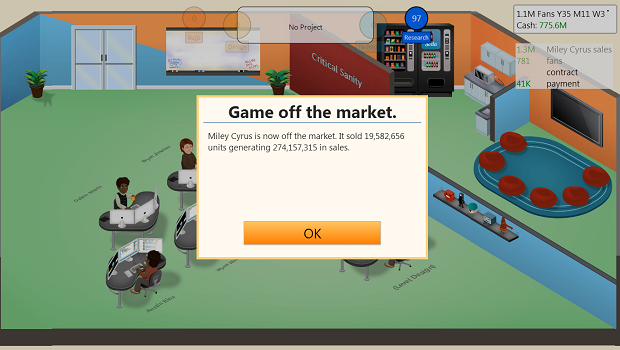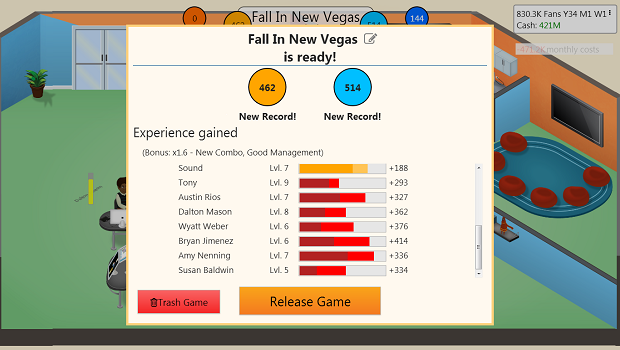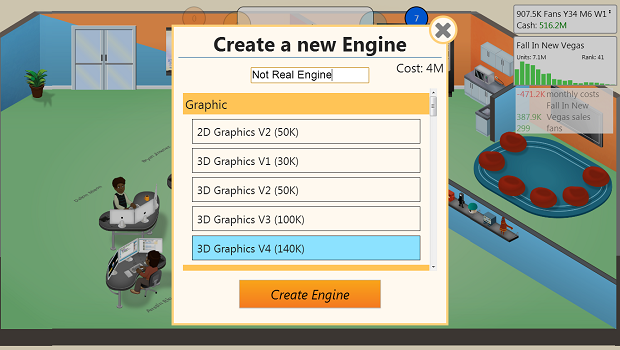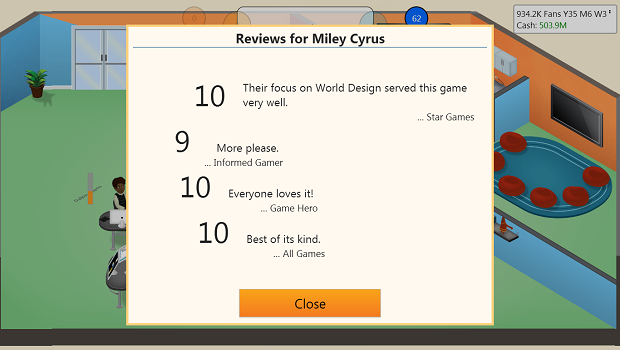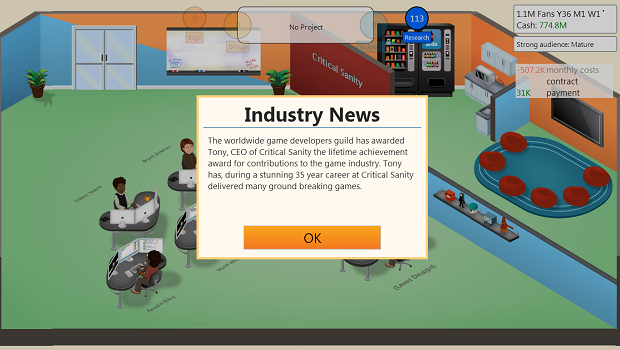The history of video games has been short, frantic, and utterly compelling. In only a few decades, gaming has grown from one-man development shops in people’s basements and garages to a massive industry with huge employment rolls and generating millions upon millions of dollars annually in revenue. Games have long since told stories; of ancient evils, historic empires, and glorious revolutions. It seems only fitting that a game would tell a story about the rise of games. What else could spin a yarn that captures the true essence of games: that the play is the thing.
Game Dev Tycoon is essentially two parallel experiences. The first is the challenge of running your own studio, building engines and releasing games to a (hopefully) ever growing throng of devoted fans. The second is the evolution of an industry, from the Commodore 64 to the current age (and even a little beyond). I’m glad that the game was designed with such an ever-present duality, because the studio management aspects quickly become tiresome, but the historical agents, implemented in a quirky, fun way, allowed me to power my studio all the way through the end-game.
The game begins with you, the player, operating a one-man game development studio out of your garage. Game Dev Tycoon has a pretty extensive tutorial system that will hold your hand as you build your first game engine and your first few creations. Every game you develop will have a genre, a type (action, RPG, sim, etc.) and a name. You’ll begin to develop the game, choosing where to expend the most effort as your new games develops through the three phases. My first effort was a dungeon-based RPG entitled Hack and Slash. I like to think my titles got more inventive as I went along, but I made it up to Hack and Slash 5, with an open-world follow-up named Hack and Slash World. As your game is developed, it will generate points in 4 areas, tech and design (which affect how good the games is), bugs (which need to be corrected prior to release, lest your fans start to hate you) and research (points that are expended to train your development team and develop more technologies, like motion-capture or an open-world, to make your game better). The real fun starts as soon as your project is finished.
Once released to the public, you’ll await the results of your first reviews. These can be pretty nerve-wracking, but are also the primary source of excitement as you wait for the results to roll in. The results are a combination of good topic/genre combination, the proper effort distribution of effort, and the number of design and tech points generated by your team during development. As time goes on, the number of points required to make a great game increases dramatically, forcing you to hire staff and train your team in order to boost the number of points they generate.
And, that’s it. The entirety of the game- make an engine, make some games, make a new engine, make some different games. It gets repetitious very quickly. Sure, you’ll unlock new technologies and genres and motion capture and whatever else you can, but nothing you gain will ever change the essential, bland nature of the game. You’ll also never see any actual evidence of your creations, save for whatever witty name you come up with for your projects. The game boils down to a creative simulator without any creation. As nice as it is to generate points, I found it got dull after a couple of hours.
The game’s tutorial is also constantly giving you bad advice. “Use a publisher to build-up your fanbase” it says. Yet, whenever I used a publisher for a game, the game tanked, and I ended up losing fans. I was able to sell millions of copies of games without a publisher, despite constant badgering from the tutorial to do otherwise.
The game’s saving grace is the backdrop: the history of gaming development. It is implemented here in hilarious fashion. As you proceed through the game, text events will occur, altering the systems available for development and the conditions under which you make games. As consoles rise and fall, are launched and suffer controversy, the game tells the story. Everything is recounted at a solid level of detail, with the names twisted in hilarious fashion (I laughed out loud at numerous points). Everyone should play this game just to get a basic sense of how gaming got where it is today.
Game Dev Tycoon is fine. I wish I could say that I loved it, but the core gameplay isn’t interesting enough, and the historical elements which engrossed me to power through failed to entertain me at a sufficient level the second time through. It’s a relatively short game, as I completed it in a hair over five hours. Still, the historical factors alone make this a playthrough for anyone interested in where the industry started and what happened to make it the presence it is today.
Game Dev Tycoon was reviewed using a Steam copy of the game provided by the developer.
